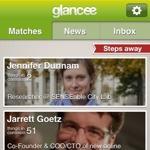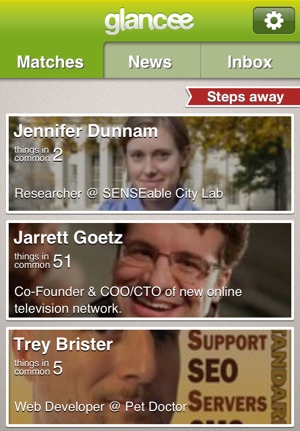
Over the weekend Facebook bought another mobile social app, this time a product called Glancee. One of the leading apps in a very new category known as “ambient location,” Glancee and its main competitor Highlight were the most talked about apps at this year’s SXSW Interactive conference in March. Highlight won the popularity contest amongst mobile phone toting hipsters at SXSW and it now has the most users of the two. However, as I discovered when I interviewed Glancee co-founder Andrea Vaccari at SXSW, Glancee’s technology is superior – at least on the backend. And that is almost certainly what Facebook was after: Glancee’s technology and talent.
So the big question is: what will Facebook do with Glancee?
This Ain’t Another Instagram
First, let’s put this acquisition into perspective. Facebook bought Instagram last month for $1 billion in cash and stock. But Instagram had 35 million users and was growing fast. Glancee is not on that level (and neither is Highlight). I confirmed with Glancee CEO Andrea Vaccari tonight that Glancee recently passed 30,000 downloads and it currently has about 20,000 users running the app in the background. Vaccari noted that the number of users who have conversations with others is lower.
So Facebook clearly didn’t buy Glancee because it viewed the company as a potential threat, which was the main reason for buying Instagram. This Glancee acquisition was about technology and talent. Although this wasn’t an “acqhire” either, the term for when a company is bought just to hire the people behind it. My understanding is that Facebook desired – and got – Glancee’s location engine as part of this deal.
What Glancee Does & How It’s Different To Foursquare
Glancee is a smartphone app that tells you when people with similar interests are in the same location as you. It’s different to Foursquare, which is about “checking in” to a place. Glancee doesn’t check you in. Instead it monitors your location in the background, using GPS signals, and alerts you to interesting people nearby.
In a nutshell, Foursquare is about places and Glancee is about the people in those places.
How does Glancee know which people nearby might interest you? It does this by connecting to Facebook and Twitter and mining the interest data on those networks (such as the things you have “liked” on Facebook and the topics you discuss on Twitter). It’s a complex app and hard to get right. Both Glancee and Highlight were plagued with technical issues at SXSW, in particular battery life drain in phones due to heavy GPS usage.
Ideas on How Facebook Will Use Glancee
Facebook doesn’t have a great track record with mobile location. Facebook Places, its attempt to mimic Foursquare‘s check-in functionality, was launched with great excitement in August 2010. However just a year later, Places was “phased out.” Four months later, Facebook acquired Foursquare-competitor Gowalla – another app to benefit from SXSW hype. What’s more, like Glancee, Gowalla was a clear second to its main competitor (in this case, Foursquare). Facebook shut Gowalla down before the year was out and nothing has been heard from it since.
My bet is that Facebook will shutter Glancee too, but make use of the technology in a new mobile location product. Its primary focus is likely to be “social discovery” – a term Andrea Vaccari used when describing Glancee in our SXSW interview. Where Places failed for Facebook is that people didn’t manually “check in” enough to locations. One benefit of Glancee is that it removes the need to check in. Another benefit is that it mines Facebook and Twitter for interest data, which is then used to make social connections. This is something that Facebook is surely very interested in exploring, as it seeks new ways to tie social networking into mobile.
Another part of Glancee that likely appealed to Facebook is the time-based diary of who was at a location before you, a feature introduced to Glancee just before SXSW. The idea being that you could try and connect with someone next time at that location. Could this be a nice mobile-focused complement to Facebook’s own Timeline?
Glancee’s technology might also be used in Facebook Messenger, alongside the group messaging app that Facebook acquired last March:



0 Responses
Stay in touch with the conversation, subscribe to the RSS feed for comments on this post.